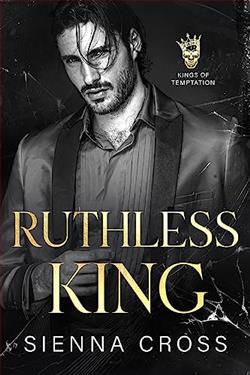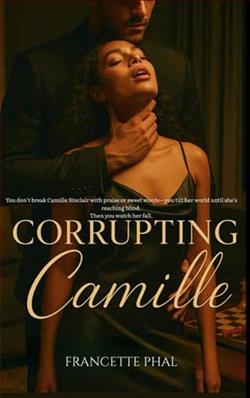Page 67 of The Ashes and the Star-Cursed King
“But I kept it,” Evelaena went on, as she dragged me around a corner. “I kept all of it. I thought he might… thought he might come back someday. Here!”
Her face lit up, and she jerked away from my grasp. In the darkness, I tripped over a raised slab of stone and had to catch myself against the wall. Evelaena flung open the door. Golden light bathed her face.
“Here!” she said. “Here it all is.”
I followed her into the room. It, unlike all the hallways that we’d come down, was lit with a steady, golden glow—sconce lanterns lined the walls, all lit as if awaiting the imminent return of its occupant. The room was small, but immaculate—the only place in this entire castle that seemed to be, truly, in one piece. A neatly made bed with blankets of violet velvet. A desk, with two golden pens, a closed leather-bound book, a single pair of gold wire-framed glasses. An armoire, one door open, two lone, fine jackets hanging within. On the coffee table, a single spoon, a single saucer. One shoe, neatly placed at the corner of the room.
I stood there staring at it all as Evelaena flung her arms out and spun around.
“Is this it?”
I was grateful that she was too drunk to hear the complicated emotion in my voice.
“All that remains, yes,” she said. “He didn’t leave much behind, all those years ago. Much of it was lost when…” Her gleeful smile faded. A shadow fell over her. “When it all happened.”
She turned to me abruptly, her big blue eyes watery and glistening under the lantern light. “A mistake, surely,” she said. “That he would destroy so much when he left. This is why I kept all of this. Some of it took years to find in the dirt and rubble. I kept it. Cleaned it. Put it here, to wait for him.”
She picked up the single shoe, her finger dancing along the edge of the laces.
I paused at the desk, and the strange collection of random items atop it. One of them was a little ink drawing of Lahor—at least, what I thought was Lahor, but the perspective was from an angle I didn’t recognize, looking down at the city from the east.
“Is there anyone else here who knew him back then?” I asked.
“Here? Living here? In this house?” Evelaena seemed confused by the question.
“Yes. Or… well, anyone. Any of…” I settled on, thinking this would go over well, “any more of our family.”
The records didn’t speak of anyone else. But hell, Lahor was very, very isolated. Who knows?
She stared blankly at me, then burst into high, manic laughter. “Of course not. There’s no one else here. He killed them all.”
I didn’t know why I wasn’t expecting this answer. I stilled, not sure how to respond.
She paused. Turned. Peered over her shoulder at me.
“Everything here changed that day,” she said. “The day he left.”
Evelaena was much younger than Vincent had been. And yet, I hadn’t done the exact math—had assumed she was born after Vincent’s ascension. But that was a hasty assumption. It hit me just how hasty it had been when I looked into her eyes now.
“You were there.” I meant it as a question. It came out as a statement.
She nodded, a slow smile spreading over her face. “I was,” she whispered, conspiratorially, like we were telling ghost stories. “He did it before he left for the Kejari. Set up all the pieces. Even then, everyone knew he would win. Especially him. So he had to set up everything beforehand. Get rid of everyone who stood in his way.” She touched the wall, like stroking the arm of an old friend. “Lahor was beautiful a long time ago. Kings lived here. It is a safe place. These walls sheltered kings during the reign of our enemies. Perhaps they will do so again, one day.” Her gaze slipped back to me, amused. “All the little kings were here, and one king slaughtered all the rest.”
Little kings.
Vincent had always spoke so dismissively about his own rise to power, and all the things he had done to facilitate it. But none of it was simple. None of it was small.
“I hid here,” Evelaena said.
“Here?”
“Here.” She pointed—to the bed. “Underneath it. I was so small, but I remember.” She tapped her temple. “He did the older ones first, then the children. His father, my father, their sisters. He probably thought he needed to do those when his strength was up, because it would be difficult. I think my father gave him a good fight.”
She spoke of all of this dreamily, calmly, as if speculating on history rather than the deaths of her family.
“Then he came here. He got Georgia, Marlena, Amith.”
“Children?” I asked quietly.















